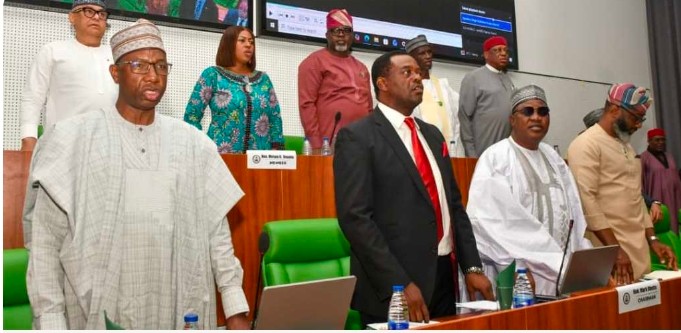News
Reps Probe N12 Trillion Management in DFIs

By Angel Ike
House of Representatives has initiated an investigation into the management of over N12 trillion injected into Nigeria’s Development Finance Institutions (DFIs) over the past seven years.
To spearhead this, it inaugurated an Ad-Hoc Committee tasked with examining the operations, funding, and performance of these institutions amid growing public concern about fund management.
Chairman of the Chairman, Chidi Obetta highlighted that this probe will focus on how public funds aimed at driving industrialization, agriculture, small and medium enterprise empowerment, and infrastructural development have been utilized by the DFIs.
Obetta disclosed that preliminary reports indicate that inflows into Nigeria’s DFIs—including government capital injections, budget funds, bond issuances, concessional loans, and donor funding have exceeded N12 trillion in the last seven years.
However, this figure is subject to verification, and the committee plans to request detailed audited data on inflows and expenditures from each DFI.
The committee’s formation responds to growing calls for transparency and accountability, given that DFIs bridge financing gaps neglected by commercial banks to promote inclusive development.
The committee aims to conduct a comprehensive review of the DFIs’ funding mechanisms and operational effectiveness, assessing how resources have been applied to reach intended beneficiaries such as industries and communities.
Obetta stressed the importance of evaluating measurable outcomes, such as job creation, industry strengthening, export growth, and improved livelihoods, alongside systems for loan recovery and fund recycling to ensure sustainability.
He reiterated that the investigation is a fact-finding and reform-oriented effort, not a punitive one, conducted with transparency and stakeholder engagement.
Speaker of the House of Representatives, Tajudeen Abbas, expressed frustration at the poor performance of Nigeria’s DFIs despite the substantial funds allocated to them.
Represented by Deputy House Leader, Halims Abdullahi, Abbas noted that DFIs have failed to significantly improve Nigeria’s Multidimensional Poverty Index or stimulate meaningful SME growth.
He pointed to issues like lack of transparency, political interference, and limited innovation as major challenges undermining these institutions’ effectiveness and contribution to national development.
He empahsised that the House’s investigation aims to clarify how DFIs operate, utilize their funds, and fulfill their mandates in critical sectors like agriculture, manufacturing, and exports.
He warned that future budget allocations would be withheld from any institution unable to demonstrate responsible financial management, sound risk practices, and clear economic impact.
Abbas also underscored the necessity for public funds to reach productive sectors and cautioned against diversion to dubious projects or bureaucratic stagnation.
The Central Bank of Nigeria (CBN) pledged full cooperation with the House committee, represented by Director Ibrahim Hassan, affirming its regulatory role over DFIs and commitment to supporting the investigation.
Hassan stated that CBN routinely ensures the soundness and compliance of DFIs with prudential standards, safeguarding their stability and effectiveness.
Meanwhile, the Managing Director of the Nigeria Export-Import Bank (NEXIM), Abba Bello, welcomed the probe as crucial for repositioning DFIs amid Nigeria’s economic challenges.
Bello assured that NEXIM would fully cooperate, emphasising the need to measure DFI success in terms of jobs created and industrial and export growth
